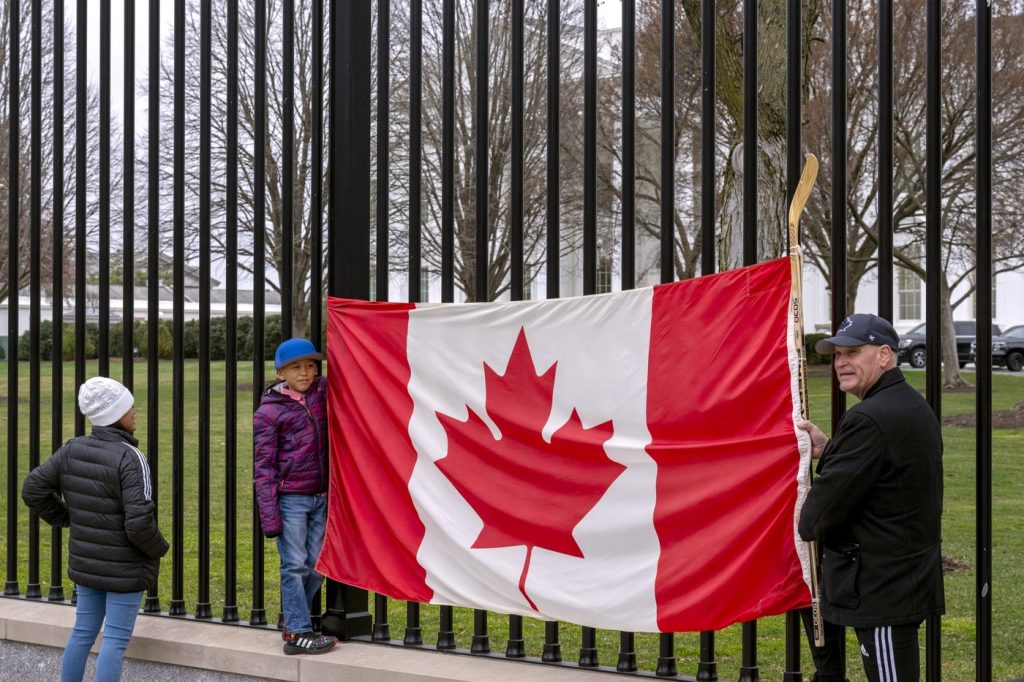The relationship between the United States and Canada has noticeably soured, with a recent poll indicating a decline in the perception of Canada as a close ally among Americans, particularly among Democrats. The survey by the Associated Press-NORC Center for Public Affairs Research found that the proportion of Democrats who view Canada as a close ally has dropped from around 70% to about 50% since President Donald Trump returned to office. Similarly, the percentage of Republicans who see Canada as an ally has decreased from 55% to 44%. Despite this decline, most respondents still consider the relationship "friendly," but only 50% now regard the U.S. and Canada as "close allies," down from approximately 60% in September 2023.
Many Americans express concern over the changes in foreign policy under Trump, particularly his aggressive stance towards trade. Lynn Huster, a 73-year-old lifelong Democrat from York, Pennsylvania, expressed her dismay over the deteriorating relationships with allies, including the United Kingdom. She noted that Canada had historically been a supportive ally, and now fears that the U.S. might end up isolated on the world stage.
The poll also coincides with Trump's policy decisions that have shifted U.S. foreign relations significantly. He has imposed extensive tariffs on goods from Canada and other countries, notably introducing a 25% tax on imported autos and planning "reciprocal" taxes mirroring tariffs from other nations, which he refers to as "Liberation Day." Such measures have alarmed many in Canada, who feel betrayed after years of cooperative relations between the two countries. Canadian Prime Minister Mark Carney has claimed that the U.S. is "no longer a reliable partner," emphasizing that Canada must prioritize its own interests moving forward.
Amid these tensions, opinions on Trump's rhetoric vary. Some, like Shaya Scher, a 35-year-old Republican from New Jersey, suggest that the President's tough talk is more bluster meant to provoke reactions and ultimately lead to beneficial negotiations. Scher remains optimistic that any tensions are temporary and believes that underlying alliances will remain intact.
Conversely, others, such as Scott Cunningham, a 69-year-old Democrat from South Bend, Indiana, argue that Trump's tariff policies are damaging longstanding goodwill and complicating trade relations. Cunningham feels that current U.S.-Canada relations are strained, characterizing them as "not friendly but not enemies." According to the survey, around 30% of Americans view Canada as "friendly but not a close ally," while about 20% consider the two nations "not friendly but not enemies." Very few Americans categorize Canada as an outright enemy.
The broader perceptions of U.S. allies appear similarly divided. The poll indicates that about half of U.S. adults still see the United Kingdom as a close ally, while only about 30% have the same view of France and Germany. The European Union garners a close ally status from roughly 40% of respondents. In contrast, very few Americans view Russia or China as allies, with one-third considering China a U.S. enemy and a comparable number feeling the same about Russia. Interestingly, Republican respondents are less inclined to view Russia as a threat compared to their Democratic counterparts.
Amidst these shifting dynamics, some Americans, like Trent Ramsaran, a 37-year-old freelancer from Brooklyn, express confidence in the U.S.'s ability to defend itself without reliance on allies, citing significant defense capabilities. Ramsaran suggests that conflicts over immigration between Trump and European leaders underscore fundamental differences in perspectives on national and global issues.
Ultimately, the survey reflects a striking shift in American sentiment towards Canada, showing how tariffs and rhetoric from Trump are reshaping perceptions and relations with a long-standing ally.










